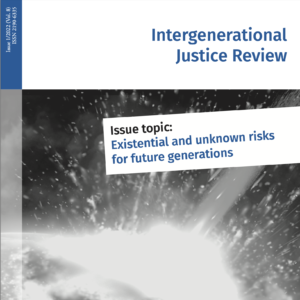The Intergenerational Foundation (IF) and the Foundation for the Rights of Future Generations (FRFG) jointly promote the Intergenerational Justice Prize. Jörg Tremmel, Editor, Felix Beer and Markus Rutsche, Co-editors, explain the topics which are published in the latest issue of the Intergenerational Justice Review.

The prize
The Intergenerational Foundation (IF) and the Foundation for the Rights of Future Generations (FRFG) jointly promote the Intergenerational Justice Prize. A total of €10,000 – generously donated by the Stiftung Apfelbaum – is awarded each year and shared among the winning entrants of this prize. The best papers have now been published in a special issue of the Intergenerational Justice Review.
The topic
Climate breakdown, the loss of biodiversity, unaligned artificial intelligence, uncontrollable pandemics, and escalating armed conflicts: humanity faces cascading and overlapping risks that threaten its long-term survival. While each of these emerging crises alone has the potential to significantly diminish our species’ future prospects, their cumulative impact poses a greater threat than the sum of their parts: a so-called polycrisis. At the extreme, a global polycrisis poses an existential challenge that could lead to civilisational collapse and ultimately human extinction. As a result of various converging shocks, the World Economic Forum 2023 warned that the world may experience such an event by the end of the decade.
How can we address existential risks?
How, then, can we address this new and burgeoning risk landscape? The traditional frameworks for managing risks are ill-equipped to deal with the complexity and magnitude of today’s challenges. New ways of thinking and acting are urgently required for this task.
Against this background, a growing movement of researchers, policymakers, and activists is dedicated to the study and mitigation of existential risks. Toby Ord, a moral philosopher and leading figure in this field, offers the following definition: “An existential risk is a risk that threatens the destruction of humanity’s long-term potential.” Under Ord’s definition, humanity would not have to go literally extinct for an existential risk to be realised, since the destruction of its potential would already occur if humanity were no longer in control of its own fate. While this notion is thought-provoking, the idea of humanity’s ‘potential’ might be interpreted in many ways. 800 years ago, European intellectuals of the time would have theorised about the human potential in an entirely different way to people today. Equally, academics in other parts of the world today might give quite different answers about the human potential than Oxford scholars (who sometimes delve in techno-utopian dreams).
An alternative definition of ‘existential risks’, offered by the IGJR-editors, sees these risks as leading to a breakdown of human-made systems to such an extent that the survivors can barely fulfil their basic needs. While this definition is still open to different interpretations as to which kind of ecological, social, technological or other catastrophes might cause this sort of breakdown, the idea of human needs provides a solid basis for assessing the standard of living for remaining mankind.
Man-made and natural risks
Existential threats can be divided into anthropogenic risks – those that stem from human actions – and natural risks – those that originate from conditions beyond human control, including massive volcanic eruptions, major asteroids, and gamma-ray bursts from stellar explosions. The odds of natural catastrophes have remained relatively constant over the last millions of years, that is: constantly low. If these odds had been different, we would likely not be here today. On this basis, it seems reasonable to expect that their likelihood will remain low over the next thousands of years as well. On the other hand, anthropogenic risks, to the extent that we are aware of them, have massively increased and accelerated in the era of the Anthropocene.
Intergenerational unfairness
The unfolding of such risks could involve massive immediate casualties, but also sustained and widespread decline in the quality of life of future generations. For this reason, it is an intergenerational and global public good that we protect current and future generations from existential risks. To face up to this responsibility, current generations urgently need to overcome their myopic biases and radically expand their timescales to encompass long-term futures. In this way, humanity could not only reduce existential risks but also imagine and unlock a pathway towards a flourishing life in the long run — a pathway that could be called existential hope.
The articles
In the first article of this issue, Johannes Kattan suggests that ‘extinction risks’ ought to be distinguished more sharply from other aspects of ‘existential risks’. See here.
The second article by Marina Morena evaluates the moral aggregation of individuals employed in much longtermist theory, which she describes as being implicitly anti-presentist. See here.
Issue 1-2022 then concludes with book reviews of the following monographs: Tolga Soydan reviews Toby Ord’s: The Precipice. Existential Risk and the Future of Humanity and Grace Clover reviews William MacAskill’s What We Owe the Future: A Million-Year View.
The Intergenerational Foundation thanks Jörg Tremmel, Editor, Felix Beer, Co-Editor and Markus Rutsche, Co-Editor for their invaluable time and energy in bringing this edition to print.
